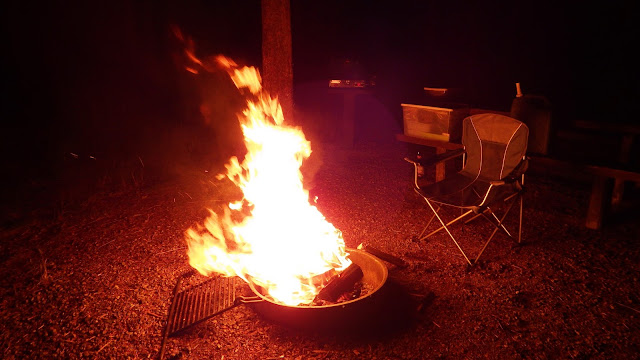It had been a cold night. There was frost everywhere when I crawled out of the tent. When I arrived at the Back Channel I was not too surprised to glimpse snow up in the high country.
I had high hopes for the Back Channel. It would be a sign of cosmic favor to revisit halcyon days of yore and catch a good fish here on the holy water. I looked carefully for rises, walking along the bank to cover the water. Nothing happening--yet.
I sat down on the bank and had a cup of coffee. Soon little black caddis danced around me. Harbingers, I thought. I walked the bank, came back, sat down, and had another cup of coffee.
I waded carefully and quietly. Of the rises I saw, most were erratic. Then I identified two fish who were now working steadily in place. One was to my left, and fairly close; the other was to my right and farther away, over in front of a little island.
I went right. This has been a propitious island in years past. More than once we have caught big fish here by targeting little rises.
I made my way to within ten feet of the rise, slightly behind the fish. I had the Harrop PMD on, and began to cast. I got a good drift, then another, the fish rising steadily. Then another...maybe I need to go a little bit farther... And the fish sipped in the fly.
He took off downstream to my left. It was a lovely dance we made, as he would zing line off the reel, and I would slowly regain it, all the time bringing him closer.
I forgot to tell you that I didn't have a net. The evening before, right after I had hooked the fish that shot out of the river like a rocket, the net was dangling in the current on my casting side. So I had grabbed it and tossed it around my back to the other side. Imagine my surprise when it came floating past me and headed downriver toward the Snake. I cast my line over it, and the fly ticked it but couldn't stop it. Later I checked the lanyard and nothing was broken or had come loose. A case of the river twisting and turning and picking my pocket.
So now I had some concern about landing this fish. I brought it in close for a photo in case I wouldn't be able to take another.
When I finally put my hand under him, though, he had decided to be stoic about the whole thing. Another beautiful Henry's Fork rainbow.
I released him and watched him swim away, then stood up and looked around for my next target. The river was quiet. I couldn't see a single rise, and the insects on the surface had thinned. I waded back to the bank and had another cup of coffee. By the time I screwed the cup back onto the old Stanley it was clear the morning on the Back Channel was over.
It was also clear what a perfect morning it had been.
I hiked out and drove back to the Last Chance stretch that had given me so much pleasure the afternoon before. There was nothing happening when I arrived, so I had some lunch while enjoying the un-summerlike view.
So I walked downstream a ways, waded in, and carefully made my way to a casting position ten feet or so to the left of and behind the fish. I showed him that lucky PMD, and on the fourth cast he took it, and I hooked him. He was a heavy fish. I can't say he was the biggest I had hooked, but he fought like it. He was determined, alright.
I still didn't have a net, so I was trying to work him into the soft water behind the rock. Still, I was nervous when I got him close enough to try to land him. Maybe that was the fatal flaw: I hesitated just long enough for him to lunge into the current and separate himself from the hook.
But what an exhilarating lunch hour.
I walked back to the van looking for more risers, but there were none. I resumed my routine of the day before, waiting and walking the bank.
A hatch began; caddis were coming off in waves. But they were in the trees and grass--they would billow out when you brushed past--and not on the water.
It was a long afternoon of waiting for the fish to show themselves. They never did.
As evening fell, I geared up again and waded out in one more effort to make something happen, or at least to be there if something happened of its own accord. I threw a variety of flies: bead head nymphs, soft hackles, and, of course caddis, dry and wet. I caught the smallest fish of the trip--of the year, I expect.
And I caught one more small fish. I felt as though I was holding the shining future in my hand.
Then I watched the day come to an end.
Back at the campground I lit the ritual Mark Memorial Campfire.
Then sat by the fire for a long time, gazing into the embers, then the moonlight, then the embers, until I finally found myself drifting off in the tent, watching as another Henry's Fork experience faded to black.





















































